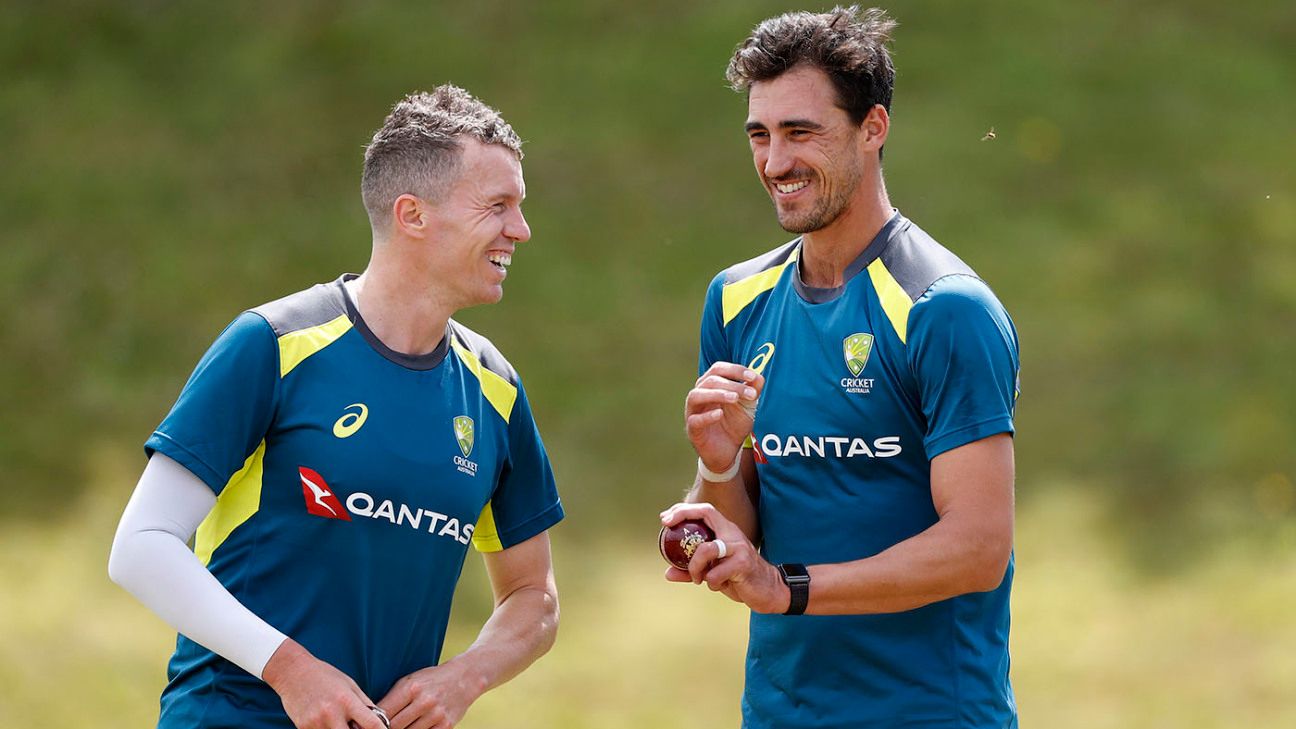
Justin Langer has said that having six fit-and-firing fast bowlers at his disposal is a "luxury" that he cannot recall enjoying at any previous point of his coaching career, but reiterated that Australia must not get complacent about their resources with four Ashes Tests still to come in the space of five weeks.
Eyebrows were raised among England fans when both Josh Hazlewood and Mitchell Starc were omitted from Australia's attack for the first Test at Edgbaston, but that selection was richly vindicated in a 251-run win that has given them the lead in an away Ashes series for the first time since 2005.
And, understandably, Langer was keeping his cards close to his chest with 48 hours to go until the series resumes at Lord's. "The same as last time, we want to keep England guessing as long as we can," he said. "We're pretty clear with the team that we think will win this next Test match, we'll see that when the toss goes up. Unless you can ask Painey [Tim Paine] the same question and he gives it away."
ALSO READ: 'Keep wearing him down' - Langer's plan for Archer
The broad strategy, however, is unmistakable and ruthless - very similar in outlook, in fact, to the one that England themselves used in Australia in 2010-11, their last successful campaign on Australian soil.
Bat as long as possible, with Steven Smith leading the line at Edgbaston but the tailenders - not least Peter Siddle - playing a vital role in the first innings, and bowl as dry as possible - with Siddle's line-and-length earning selection ahead of Starc due to his tendency to go for runs in red-ball cricket in exchange for his wicket-taking deliveries.
And, in the event of attrition taking its toll in the course of the series - as it did nine years ago with Stuart Broad going lame during the Brisbane Test and Steven Finn proving too expensive for the team tacticians after Perth - ensure that the fast-bowling bench-strength (Chris Tremlett and Tim Bresnan on that occasion) is hungry and ready for action.
The condensed Ashes itinerary, Langer admitted, was having a "big impact" on the selection of their Test XI, and with just a three-day turnaround to the second Test at Headingley on August 22, it was only going to get more acute.
"We know that back-to-back Tests are always hard," he said. "We were lucky in the first Test that our fast bowlers didn't have to bowl much in the second innings, as Nathan [Lyon] bowled very well and the way the game panned out. But it's certainly something that's on our mind. It will be on England's mind as well. You've got to get through back-to-back Test matches, that's why Test series are hard, Ashes series are hard.
"Why we're fortunate at the moment is that we've got six fit-and-healthy fast bowlers. I've been coaching for about 10 years now and I can't ever remember having that luxury, but it could change like that so we're not getting carried away with it.
"The fact that we had Josh and Mitch Starc on the bench last Test match, it doesn't happen very often, so we won't get complacent with it, we'll just be happy we're in that spot."
One reason why Australia may yet name an unchanged XI lies in the success of Australia's lower order - not least Siddle, whose critical innings of 44 helped rescue Australia from 122 for 8 and give Smith an obdurate ally en route to arguably the finest Test century of his career.
"Test cricket is a big game of chess," Langer said. "I thought Siddle's batting was the big difference in the Test match, and that was one of our game plans at the start of the summer.
"We saw how frustrating it was with England's tail in the first innings, it's the same with us," he added. "You always have the strategy, the strategy of every team will be the same, but then you have to put it into practice.
"The boys have done that, the bowlers have probably hit more balls in this series than they have in their whole life. Hopefully it pays dividends, and it's not just talk about it."















 Phone: (800) 737. 6040
Phone: (800) 737. 6040 Fax: (800) 825 5558
Fax: (800) 825 5558 Website:
Website:  Email:
Email: 






